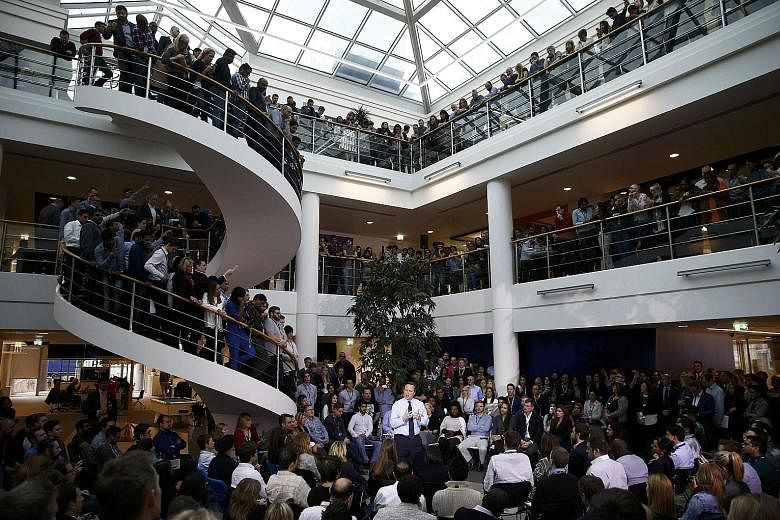With just under 120 days of campaigning left before a referendum on whether Britain should stay in or get out of the European Union, the nation's politicians are leaving nothing to chance. Parliament in London is spending most of this week addressing the referendum's technical details before the June 23 vote.
And for good reasons. With opinion polls indicating the result is too close to call, anything from the way the campaigning is organised to the design of the ballot papers can make a substantial difference to the outcome.
Historically, British politicians have been hostile to the idea of referendums; Parliament rather than the "mob", as constitutional lawyers put it, was responsible for national decisions.
But since successive British governments were either too reluctant to take controversial decisions or too divided from within, referendums have become a frequent method of saving politicians from their own difficulties. Britain has held no fewer than 10 major referendums over the past two decades.
Still, politicians haggle over the details of each referendum.
One controversial question is who should be allowed to vote, never as straightforward as it appears.
In the 2014 referendum on whether Scotland should separate from Britain, pro-independence activists demanded that Scots living abroad should not be allowed to vote since they were assumed to be hostile to Scotland's independence, but demanded the voting age in Scotland be lowered from 18 to 16, on the assumption that younger people were more likely to support the United Kingdom's break-up.
Prime Minister David Cameron conceded on both these points because he feared that if the government was seen to be "cooking" the electoral roll, the referendum's outcome would not be accepted as legitimate. The gamble paid off, with over 55 per cent of those who voted rejecting the option of Scottish independence; neither the absence of overseas voters nor the presence of teenagers made much difference.
Encouraged by this example, Mr Cameron has made similar concessions to his opponents in the run-up to June's referendum. The government has decided EU citizens residing in Britain, who otherwise would have had the right to vote, will not be allowed to cast their ballots.
The last thing Mr Cameron wants is a close result decided by the estimated 1.5 million EU citizens now living in Britain, most of whom are presumed to be supporting continued British membership in the Union.
Curiously, however, citizens of former British colonies legally resident in Britain will be allowed to vote. It says a lot about Britain's peculiarity that it is considered perfectly legitimate for a citizen of, say, Singapore, to decide Britain's future, but not for a citizen of neighbouring France to do the same.
Still, when it comes to the question on the ballot papers, Mr Cameron has learnt from past mistakes. In the Scottish referendum, the electorate was asked whether Scotland "should be an independent country", so those who wanted to keep the UK together had to persuade voters to say "no", a far trickier proposition than persuading people to opt for the positive.
For the June referendum, the question is "Should the United Kingdom remain a member of the European Union or leave the European Union?"
Those who argue for keeping matters as they are can make a positive choice by ticking the "remain" box. And that could give pro-Europeans a slight psychological advantage.
The Electoral Commission, which polices the ballots, has imposed strict spending limits on all sides: the pro- and anti-EU camps are entitled to £600,000 (S$1.2 million) each in government grants and may spend a further £6.4 million of donation money on the campaign.
But supporters of the EU enjoy the backing of various business organisations which are providing publicity for free, while the opponents of Britain's continued EU membership remain badly split and are yet to name the single umbrella organisation recognised by the Electoral Commission.
Still, Mr Cameron, who leads the "stay in the EU" campaign, cannot relax. The indications are that his initial tactic, to negotiate a special deal for Britain in the EU and present it to the electorate as a justification for keeping Britain in Europe has already failed: the deal Mr Cameron secured last week is now largely forgotten.
And the latest opinion polls, released yesterday, indicate that while 37 per cent of the electorate wants Britain to stay in the EU, 38 per cent wants to get out.
The fight is over the undecided, who account for a quarter of the electorate.

